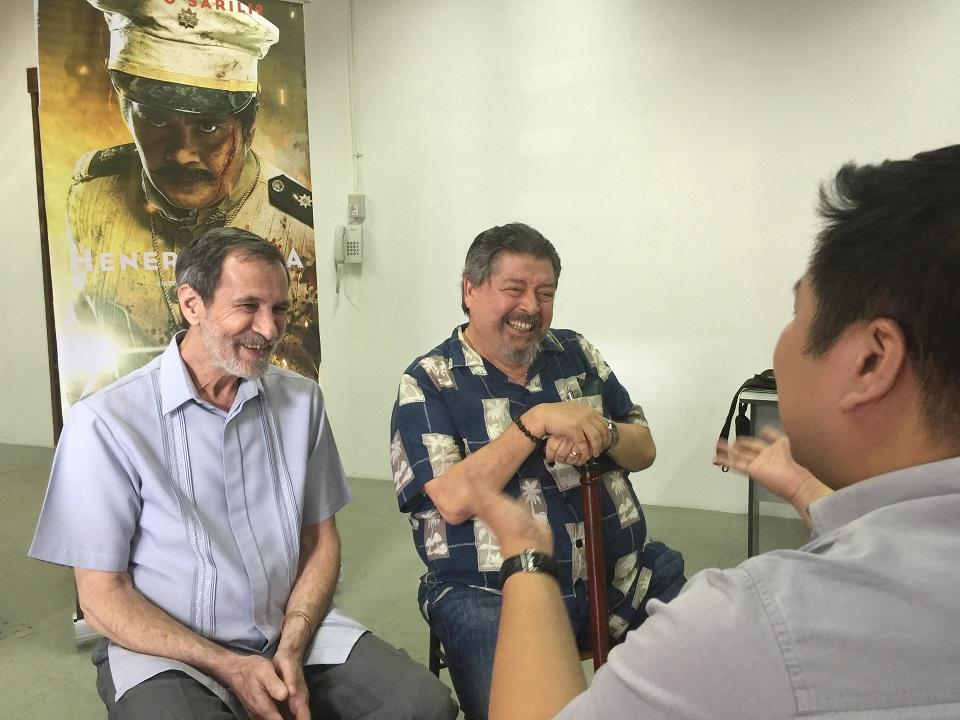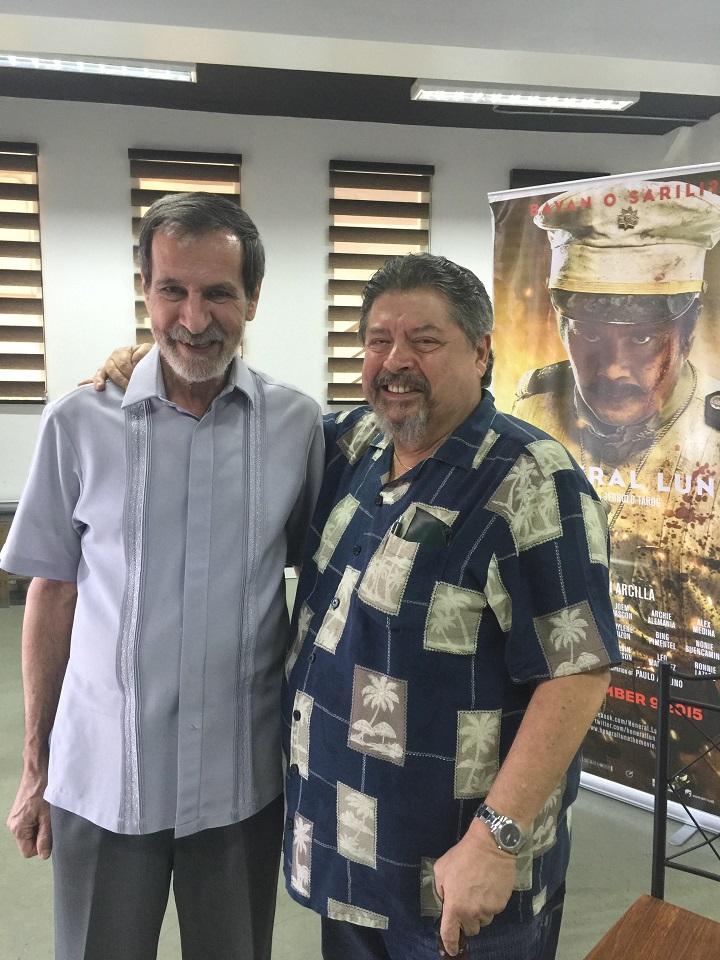Making the cultural phenomenon that is ‘Heneral Luna’

The fiery general—and Filipino hero—Antonio Luna would have been 149 years old last October 29.
And if he were still alive, he would have been happy to know (that is, if he was also in a good mood) that a film about his life has grossed over P200 million in the Philippines alone and is already beginning to be screened in cities across the US.
"Heneral Luna," which has reached iconic status among Pinoy audiences, is also the country's entry to the next Academy Awards for Best Foreign Film.
Its planned follow-up, this time focusing on General Gregorio del Pilar (played in the film by Paulo Avelino), is set to be filmed.
The script was originally written by Eduardo A. Rocha and the late Henry Hunt Francia 18 years ago. It found its way to businessman Fernando Ortigas, who shelled out P70 million to finance the film. They then tapped young filmmaker Jerrold Tarog to helm the project.
GMA News sat down with Rocha and Ortigas to learn their thoughts about "Heneral Luna" the film and Luna the hero.
GMA News: How do you feel about the overwhelming reception to, and success of, "Heneral Luna"?
E.A. Rocha: On many occasions it brought tears to my eyes because of their commitment to this film, especially their posts on Facebook, on social media. They took ownership of it and that’s the biggest compliment we could get.
Read: 21-year-old illustrator wins ‘Heneral Luna’ fan art contest
Fernando Ortigas: I feel the same. It’s something, well...the press, the publicity, and the so-called "bigness" it has become and it’s something we’re, I don’t know, it’s just staggering and we’re just trying to keep up with the pace. We’re still trying to make all Filipino people to go and watch it.
GMA News: How has this changed you and [production company] Artikulo Uno?
Ortigas: Well, I know we’ve been getting a lot of scripts from every person, we’ve gotten emails from one family to another family who’s got a big hero in their family that we should do a movie about, so we got a long list of heroes to do. [Smiles] Oh yes! All Filipino heroes, from Lapu-Lapu to Mabini.
GMA News: How do you respond to those who sent you scripts?
Ortigas: We did agree that we will form an in-house team and we would try as much as possible to not turn away anybody and go to the scripts and see how good they are, give suggestions and some of them we told them to develop. There are a lot of good scripts, but now we just have to pick which ones are more significant and, at the end of the day, which I can afford to do.
Rocha: Every script that was given to us will be read. We proved that our audience is not “babaw.” [Our] trust in the Filipino audience was well-founded. There’s no such thing as "masa"; they just have to have the opportunity to choose [good films to watch].

GMA News: What was the hardest or most complicated scene to shoot and why?
Rocha: What comes to mind is that we get into Luna’s head, that one-take sequence about six and half minutes long that took all day to shoot. That was very difficult. And of course the battle sequences; the heat in Tarlac was unbearable.
Ortigas: Because we shot at the height of summer.
Rocha: And the big crowd when they came in to make the trenches, but that was so well-organized it was done in one day.”
GMA News: What’s your favorite scene?
Rocha: My favorite in terms of light is the train sequence, but my favorite scene really is the Spoliarium and also the intercutting between the future and the past and the reciting of the last poem between Luna and Joven, the whirlwinds of dust. My hair was standing and I was crying, and then the flag burns.
Ortigas: For the comic part it’s the train scene. When I read the script I was just laughing so hard everybody in my house was wondering why! But for a few of the battle scenes, when I first saw the first cut I had tears in my eyes. It was really heartbreaking and I’m getting goosebumps now, and towards the end when Joven and Luna came in, reciting his poem, I said, "Oh my God I’m crying." Those were touching scenes.
GMA News: How has "Heneral Luna" elevated the status of your actors, like John Arcilla?
Rocha: “He [Arcilla] has deserved this for a long time now. He’s a hell of an actor. I’ve known him since he was 17, 18 years old; it’s about time. And he breaks the matinee-idol rule—I mean, a star now is being respected for his acting prowess. That’s the way it should be.
@johnarcilla lets us in on his portrayal of #HeneralLuna. Watch out for his full interview on our website soon! In the meantime, check out HENERAL LUNA IN CINEMAS STARTING TODAY! #BayanOSarili
Posted by HENERAL LUNA on Tuesday, September 8, 2015
GMA News: Any sidelights you can share on the filming process? Among the film's actors, who is the funniest, who is the serious one, and who is the one who emulates Heneral Luna in real life?
Rocha: They’re all clowns! It was the lightest set, despite the heavy scenes. I mean, Epy Quizon [who played Apolinario Mabini], Archie Alemania [Captain Rusca]? Come on, you get those guys going, it’s a madhouse! It’s hilarious. Alvin Anson [General Alejandrino], Mon Confiado [Emilio Aguinaldo] there, you know, Art Acuña [Manuel Bernal]...if you see us it looks like we have been making films together our whole lives.
HENERAL LUNA BEHIND THE SCENES: Directing, Editing and ScoringHENERAL LUNA BEHIND THE SCENESFeaturing the DIRECTING, EDITING AND SCORING of HENERAL LUNAHENERAL LUNA opens in cinemas nationwide on September 9. Learn more about the film at www.henerallunathemovie.com.
Posted by HENERAL LUNA on Thursday, August 20, 2015
GMA News: What was your reaction to the varying opinions and interpretations from historians about "Heneral Luna"?
Rocha: Well, happy. Controversy is good; it causes discussion. This is not a history class. The movie was partial fictionalized, too, but based on their character that we know about. We wanted to cause people to think, "What is wrong with us? Why are we this way? Can we change? Let’s change! It’s about time."
Rocha: Luna is the closest you can get to a Shakespearean tragedy, because [what happened to him] has a lot to do with him, his fault. You look at the movie carefully: he makes a lot of mistakes. We didn’t whitewash Luna. John Arcilla put it well: he was a very imperfect man who loved his country perfectly.
Read: ‘Heneral Luna’ star John Arcilla on the hero and the film
Ortigas: The first time I got the script, I knew who Juan Luna was. I knew there was an Antonio Luna, a general, but I didn’t know the way he died, so as soon as I got it I, we looked up Luna's life and read his life story and, "Oh my God, was he really killed this way?" Like, this number of blows and shots? From there I thought, OK, let me see who the other heroes were during that time...I’m hoping students and [everybody] will see what they did, why they were heroes, why they passed away, and most importantly, what changed from their death, how the country improved.
GMA News: As producers, what are the film's chances at the Oscars?
Rocha: From every foreign film that comes in, they will pick the shortlist of nine on December 15. That's how hard it’s going to be. We never made the shortlist before; even getting there would be a great honor.
But the biggest honor is that our country picked our film. They felt it best represented our country and our nation so we are very proud of that. The odds are very dim, but we are going to give it a good shot. I mean, Luna against all odds kept up the fight and we plan to keep up the fight ourselves.
GMA News: Is Artikulo Uno feeling the pressure more after the success of "Heneral Luna"?
Rocha: No, but we will continue making films that we feel are relevant or even avant-garde. We want to give the Filipino audience the alternative. We will continue doing that.
GMA News: Do you have any advice to young, aspiring filmmakers and producers?
Ortigas: What we are hoping that our success and the way how we worked about it might encourage other individuals who are wealthy enough to do their own [films]. Let them do their own topic and go with it. Showcase the Filipino people—and not only showcase the Filipino people as in poverty. We’ve got a lot better stories than poverty.
Rocha: There’s a line in "Heneral Luna", “You have to jump in the abyss.” That’s exactly what he [Fernando Ortigas] did because he wanted this message to come across. I wrote the script 18 years ago. Nobody had the balls to back it. In other words, what I realized is that if you keep on believing in something, don’t give up hope, because when the time is right it will happen. The stars aligned—the script, Jerrold Tarog came into the picture, Fernando came into the picture, and this was the right time. This was the perfect time. It was on God’s time.
GMA News: If Heneral Luna were alive and in our midst today and you come face face with him, what would you tell him?
Rocha: Can you watch your temper, can you just make good decisions and don’t get too hot-headed and blinded by your pride, because you’re a damn good general! [laughs]
Ortigas: That I would follow him if we were in a war. — BM, GMA News




